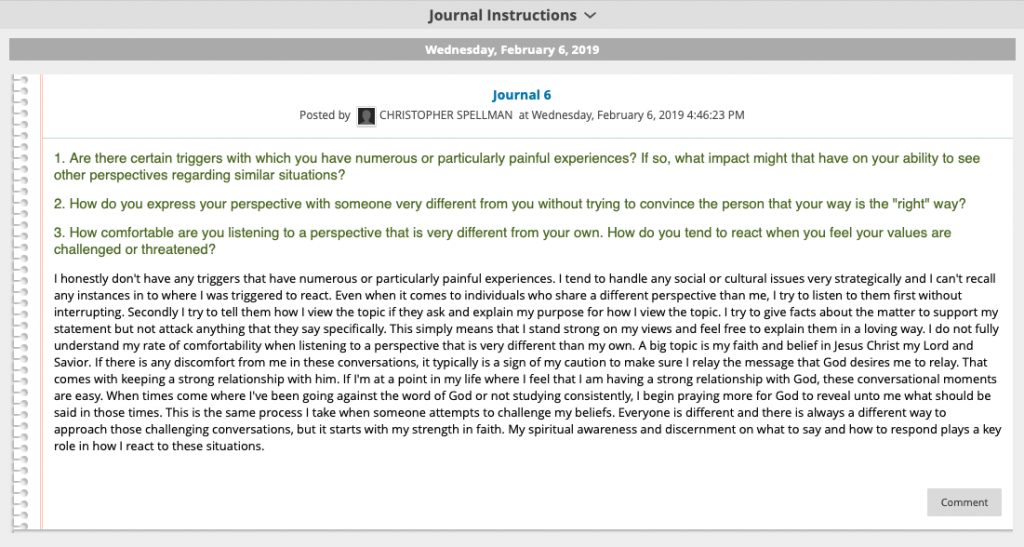This component of the LeADERS Program enables students to develop cultural awareness by examining cultural differences and concepts that impact individuals and society. In order to gain credit for completion of the Diversity component of the LeADERS Program, I enrolled in PAS 409 – Leadership and Cultural Competence.
This course focuses on the study of contemporary leadership theory and practice, primarily from the public service perspective, with significant emphasis on the critical themes of ethics and cultural competence. The literature and exercises are chosen specifically to introduce established and emerging perspectives on leadership, ethics, and cultural competence, and to examine those perspectives in a real-world context where students will be able to apply skills, techniques, and concepts to practical situations.
Team Project with Individual Reflection – Social Identity Conflict Triggers
PAS-409-Group-Project-3Instructions: Dr. Merriman randomly assigned each student to a team to complete a project on identifying triggers of social identity conflict. Identifying and understanding triggers is a foundational skill for effective leadership across differences. Because social identity conflicts are typically emotional in nature and reflect social and power relationships in society at large, the ability to recognize triggering events and their connection to societal issues is a key skill. View the movie “Take the Lead,” watching carefully for occurrences of the five triggers listed in the project table. A description of each trigger type is provided in the table above. When completing the table, remember the following (If there are multiple instances of any of the trigger types, list a maximum of three that your team considers most relevant. For each trigger, describe the social and power issues specific to that instance. After completing the team project, each student will write a reflection in their journal responding personally to the three reflection questions that accompany the table.)

Complete Exercise One – “Mapping Your Social Identities” in primary text (pages 183-192).
Instructions: Creating a map of your identity is a way to capture and articulate how you see yourself. Your identity map should include the three components discussed in the readings – given identity, chosen identity, and core identity:

- In the outer ring write words that describe your given identity: the attributes or conditions that you had no choice about from birth or later.
- In the next ring, list aspects of your chosen identity.
- In the center, write your attributes — traits, behaviors, beliefs, values, and skills that you think make you unique as an individual. Select things that are relatively enduring about you or that are key to who you are today.
- Items with (+) contributes positively, (-) contributes negatively to your ability to lead effectively in your organization. The (?) sign indicate that the item varies in how they affect your leadership.
The Mapping Your Social Identities assignment allowed me to evaluate my own identities prior to enhancing my cultural competence.
Due to the work I’ve completed in this course and the instruction of Dr. Connie Merriman, I’ve been able to do the following:
- Analyze and critically evaluate my own leadership style and cultural competency, including strengths and weaknesses, and develop an action plan for personal development;
- Demonstrate a clear understanding of “cultural intelligence” and its capability sets;
- Demonstrate a clear understanding of the concepts of culture, cultural differences and cultural groups;
- Demonstrate a clear understanding of the impact of individual differences and different situations on the practice of leadership, and the role of cultural competence in effective leadership.
- Demonstrate a clear understanding of ethical dimensions of leadership and the ability to think critically about the ethical responsibilities of public sector leaders;
- Demonstrate the ability to reflect orally and in writing about real-life leadership situations in the context of leadership and cultural competency literature.
PAS 409 has equipped me to use the skills above in the field of Higher Education Administration and Student Affairs. Cultural competency is imperative to have in a field where higher education continues to expand its’ diversity across the nation.